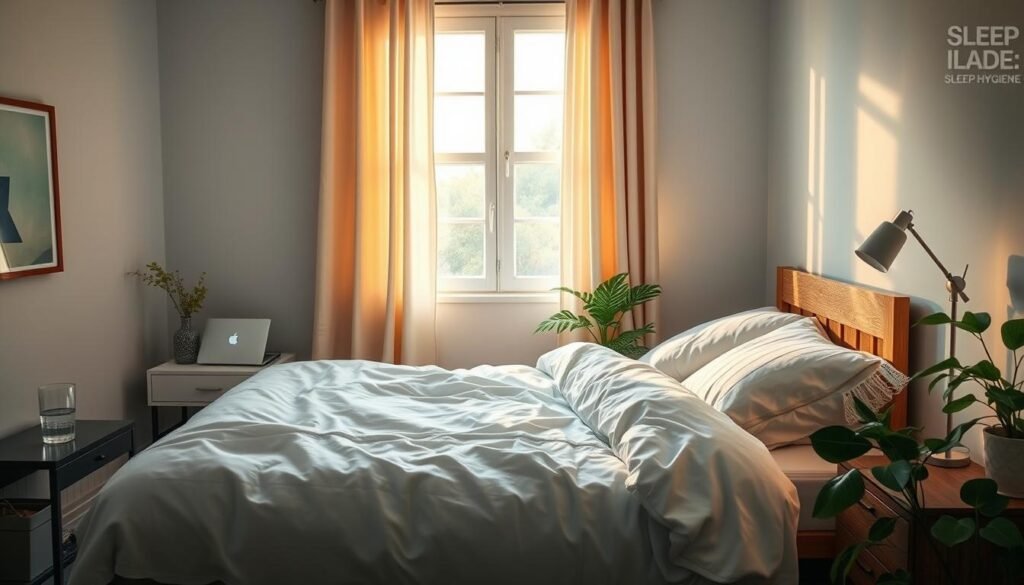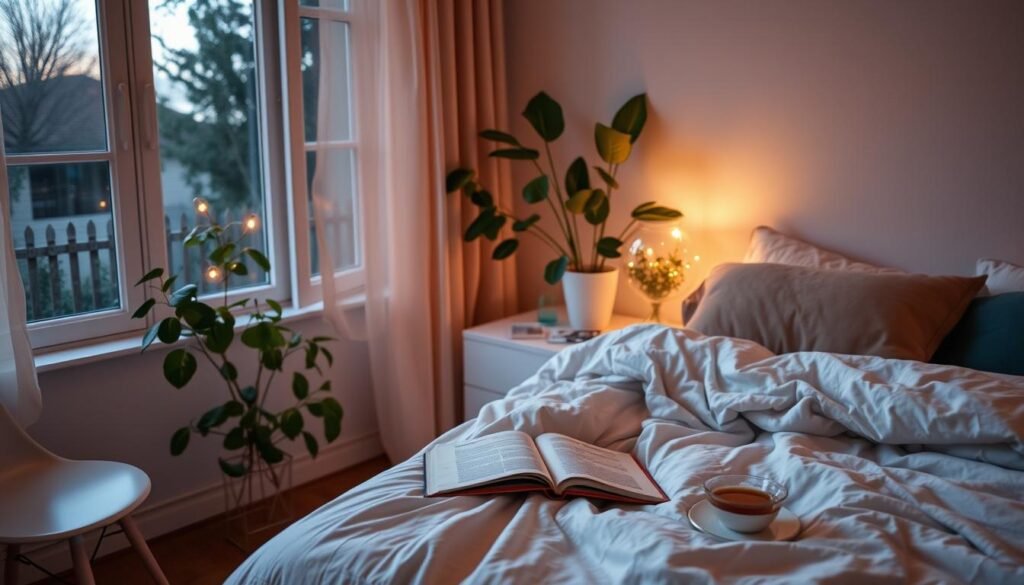About 90% of people with depression struggle with sleep issues. This fact underscores the deep link between chronic insomnia and depression. These two health concerns often merge, making each other worse. The link is a two-way street: Insomnia can heighten depression symptoms, and depression can make it harder to sleep. Grasping this relationship is key for anyone wanting to better their mental health and sleep.
This guide will explore how chronic insomnia and depression are connected. It will also highlight how to combat these issues. By tackling both, people can greatly improve their mental health and life quality.
Key Takeaways
- Chronic insomnia and depression frequently coexist, with 90% of those with depression experiencing sleep issues.
- Both conditions contribute to a cycle that can exacerbate symptoms and overall distress.
- Effective treatments often include a combination of therapies addressing both insomnia and depression.
- Various lifestyle and natural remedies can also play a role in improving sleep and mood.
- Recognizing symptoms early is vital for effective intervention and management.
- Consulting a professional can help create a tailored treatment plan to address both disorders.
Understanding the Connection Between Sleep and Mental Health
Sleep and mental health are deeply connected, affecting each other. Poor sleep can lead to mood problems like anxiety and depression. About 90% of people with depression also struggle with sleep, often facing insomnia.
The Bidirectional Relationship of Sleep and Depression
One in three adults worldwide may suffer from chronic insomnia, especially during stressful times like pandemics. Sleep issues, particularly insomnia, have more than doubled recently. Finding early signs of depression and sleep issues is key. This awareness helps improve treatment success.
People with mood problems might wake up early, have trouble falling asleep, or have restless sleep. Addressing both mood and sleep together is important for effective treatment.
Common Sleep Disorders Associated with Depression
Depression is linked with disorders like sleep apnea and restless legs syndrome, worsening depression symptoms. Sufferers might experience too little or too much sleep. This irregular sleep can increase fatigue and make mood issues worse. Tailoring treatments to address sleep impacts on mental health is important.
| Factor | Impact on Sleep Disorders | Impact on Depression |
|---|---|---|
| Chronic Insomnia | Restless nights and fatigue | Increased severity of depressive symptoms |
| Obstructive Sleep Apnea | Frequent sleep disturbances | Greater risk of mood disturbances |
| Restless Legs Syndrome | Interrupted sleep cycles | Worsened anxiety and sadness |
What is Chronic Insomnia?
Chronic insomnia is a long-term sleep issue that disrupts day-to-day life. It means having trouble sleeping at least three nights a week for over three months. This is different from the occasional trouble sleeping that about 10% of people experience. It greatly affects one’s health and happiness.
Defining Chronic Insomnia
There are many reasons why people get chronic insomnia. Stress, noise, and changing sleep schedules can cause it. Mental health problems like anxiety and depression can also lead to insomnia. Older adults and women are more likely to face these sleep challenges. Insomnia can signal deeper issues, like anxiety disorders.
Symptoms and Effects of Chronic Insomnia
People with chronic insomnia may feel very tired during the day. They might also be irritable and have trouble thinking clearly. These issues can hurt how well they do everyday tasks and make them unhappy.
To avoid these problems, it’s important to treat insomnia early. Visit this link for more information: https://www.mayoclinic.org/diseases-conditions/insomnia/symptoms-causes/syc-20355167. Not treating it can lead to depression and heart issues. The best treatments often include therapy and taking care of any other health issues. This can help improve sleep and mental health.
Chronic Insomnia and Depression: The Overlapping Symptoms
Chronic insomnia and depression are closely linked, with shared symptoms that can make treatment complex. It’s vital for people to understand these symptoms when looking for mental health answers.
Identifying Symptoms of Depression
Symptoms that signal depression include:
- Persistent sadness
- Irritability
- Loss of interest in everyday things
- Sleep problems, like trouble falling asleep or waking up too early
These symptoms can look a lot like the exhaustion and stress from lack of sleep. This can cause confusion about the real problem, whether it’s anxiety or trouble with thinking clearly.
The Impact of Insomnia on Cognitive Function
Insomnia can deeply affect your thinking. It can make depression symptoms worse. This impact includes:
- Problems focusing
- Hard time making decisions
- Forgetting things
Studies show people with both chronic insomnia and depression often feel very sleepy and overactive during the day. These shared symptoms add to daily struggles, making thinking harder and lowering life quality.
The Importance of Early Intervention
It’s crucial to spot the signs of chronic insomnia and depression early. People suffering from both can find themselves in a tough cycle. Sleep problems can make mood disorders worse. Over 40% of people with schizophrenia spectrum disorders have chronic insomnia. This also happens in other mental health conditions. Spotting these signs early is key to getting the right help quickly.
Recognizing Signs of Co-occurring Disorders
Co-occurring disorders show up in several ways. Frequent insomnia and mood changes often mean it’s time for a check-up. More than half of those with mood disorders also have trouble sleeping. This makes sleep issues an important sign to watch for.
- Difficulty concentrating or making decisions
- Increased irritability or mood swings
- Chronic fatigue despite enough sleep
- Feelings of hopelessness or despair
- Physical symptoms like headaches or stomach problems
Spotting these signs early encourages seeking professional help. This can stop things from getting worse for both mental and physical health.
When to Seek Professional Help
Getting professional help is critical when sleep issues don’t go away and impact daily life. Ignoring these problems can make chronic insomnia and depression harder to treat. Undiagnosed sleep issues can badly affect how well treatments for mental health conditions work.
- Ongoing sleep disturbances
- Worsening depression
- Problems with work or social life
If you’re facing these issues, seeing a doctor as soon as possible is important. Getting help early can make a big difference in your health and happiness. Looking into sleep disorders in mental health care shows treating them helps a lot. To learn more, visit this link about fighting depression.

Effective Approaches to Treating Chronic Insomnia and Depression
Dealing with chronic insomnia and depression takes multiple solutions. Combining therapy and medical help usually works best. People often feel better when they take care of both issues together.
Combining Psychological and Medical Treatments
For the best results, mixing different strategies is key. This mix might include talking therapies, changes in daily habits, and sometimes medicine. Cognitive Behavioral Therapy (CBT) is especially good. It changes sleep habits and thoughts to improve rest and ease depression.
The Role of Cognitive Behavioral Therapy (CBT)
CBT-I is the top method for fighting sleep troubles. Studies show it’s as good as or better than medicine for better sleep. It fights insomnia’s underlying causes.
CBT needs hard work, like practicing relaxation, learning about sleep, and fixing negative thoughts. It might be tough at first, but it leads to lasting sleep improvements. And there’s no worry about becoming dependent on pills.
Non-Medication Options for Sleep Improvement
Improving sleep quality and mood without medication is vital. Practicing sleep hygiene and regular exercise are key. These methods help you sleep better and improve your mood.
Practicing Sleep Hygiene
Good sleep hygiene can make your sleep better. Here are the main points:
- Maintaining a consistent sleep schedule by going to bed and waking up at the same time every day.
- Creating a calming bedtime environment by ensuring a cool, dark, and quiet room.
- Limiting screen time at least an hour before bed to reduce the impact of blue light on sleep.
- Avoiding heavy meals and caffeine close to bedtime to prevent disruptions during the night.
Exercise and Its Benefits for Sleep and Mood
Regular exercise can improve your life in many ways. It’s a natural way to fix sleep problems and mood swings:
- Exercise promotes the release of endorphins, enhancing mood and reducing symptoms of depression.
- Moderate to vigorous physical activity is linked with improved sleep quality and shorter sleep onset latency.
- Engaging in exercise regularly can help in reducing anxiety, contributing to better overall sleep.

By working on sleep hygiene and adding exercise into your life, you can fight insomnia and better your mental health.
Medication Options: What Works Best?
Managing chronic insomnia and depression often requires multiple approaches, including medication. Understanding what works best for each person is essential. This section looks at commonly used antidepressants and safe sleep medication use. It aims for the best health outcomes.
Commonly Prescribed Antidepressants
Antidepressants help with mood and sleep issues. Selective serotonin reuptake inhibitors (SSRIs) like Citalopram (Celexa) and Fluoxetine (Prozac) are common. They can improve mood and help with sleep. However, they might cause insomnia for some.
Serotonin and norepinephrine reuptake inhibitors (SNRIs), such as Duloxetine (Cymbalta), are another option. These are used when SSRIs don’t work. Medications like Amitriptyline (Elavil) can also help with depression.
Sedating antidepressants like Mirtazapine (Remeron) improve sleep. They are useful for people with sleep problems and depression.
Safe Use of Sleep Medications
Sleep meds like Eszopiclone (Lunesta) help induce sleep. Melatonin supplements are effective too. Orexin receptor antagonists, such as suvorexant (Belsomra), block wakefulness signals. This improves sleep quality.
However, these meds require careful use. They can cause side effects like dizziness and headaches. It’s crucial to follow a doctor’s advice on use. Avoid alcohol and opioids with these meds to prevent risks.
| Medication Type | Examples | Potential Side Effects |
|---|---|---|
| SSRIs | Citalopram, Fluoxetine, Sertraline | Insomnia, dizziness, nausea |
| SNRIs | Duloxetine, Venlafaxine | Increased anxiety, dizziness, fatigue |
| Sedating Antidepressants | Mirtazapine, Trazodone | Dry mouth, weight changes, prolonged drowsiness |
| Hypnotics | Zolpidem, Temazepam | Daytime drowsiness, confusion, memory issues |
| Orexin Receptor Antagonists | Suvorexant, Daridorexant | Dizziness, headache, sleep-related behaviors |
Tackling insomnia and depression effectively can boost well-being. Consulting a healthcare provider is key. Together, you can choose the right treatment. Regular check-ups ensure the best care for these complex issues.
Lifestyle Changes for Better Sleep and Mood
Making intentional lifestyle changes can greatly improve sleep and mood. A regular sleep schedule helps the body know it’s time to rest. Eating right also plays a big part in feeling good. Choosing foods that boost sleep and mood is crucial in managing your lifestyle.
Establishing a Routine for Sleep
Having a solid sleep routine is key for better sleep. Important steps include:
- Maintaining a consistent sleep schedule by going to bed and waking up at the same time daily.
- Creating a calming pre-sleep routine, such as reading or practicing relaxation techniques.
- Avoiding bright light exposure and electronic devices in the hour leading up to bedtime.
These changes make falling asleep easier, helping to fix insomnia problems.
Diet and Its Influence on Sleep Quality
The diet plays a big role in how well you sleep. Foods high in omega-3s, tryptophan, and magnesium help with sleep. The Mediterranean and DASH diets also help sleep better. Eating well can lessen chronic insomnia and improve your mood.
- Avoiding heavy meals and caffeine a few hours before bed is important.
- Adding calming foods, like nuts and seeds, to your evening snacks can help with sleep.
By changing sleep habits and what you eat, you can better your mental health and overall wellness.

Natural Remedies for Sleep and Mood Enhancement
Natural remedies are very helpful for better sleep and mood. They include supplements and mind-body practices. These strategies support well-being.
Potential Benefits of Supplements
Many supplements are known to help with sleep and mood:
- Melatonin: It helps regulate sleep cycles, improving daytime sleep quality and decreasing the time to fall asleep.
- Valerian Root: This can improve sleep quality and duration for some people.
- Magnesium: Studies suggest magnesium helps people fall asleep faster than usual.
- Lavender Aromatherapy: Lavender can make sleep quality better for people, even those without insomnia.
- Passionflower Extract: It’s shown to improve sleep time, efficiency, and reduce wake time for insomnia sufferers.
- Chamomile Tea: With calming effects, it’s often used to help with sleep problems.
- Warm Milk and Tart Cherry Juice: These are old remedies for relaxation and better sleep.
Mind-Body Practices for Well-being
Mind-body practices make a big difference in well-being:
- Yoga: It lowers stress and enhances relaxation, improving sleep quality.
- Meditation: Regular meditation lowers anxiety, leading to better sleep.
- Tai Chi: This exercise promotes relaxation and boosts mood and sleep quality.
Over 60 million Americans face poor sleep quality. Exploring natural remedies and practices can help improve sleep and mood significantly.
Conclusion
The link between chronic insomnia and depression is complex. Treating both requires a well-rounded approach. Nearly 90% of people with depression have trouble sleeping. So, treatments need to address both sleep problems and feelings of depression.
To improve mental health, trying different treatments is key. This can involve therapy, changing daily habits, and sometimes medicine. Treating insomnia does more than improve sleep. It also lowers the chance of having depression for the first time or again.
If you’re dealing with insomnia and depression together, getting help early is crucial. Working with doctors to find treatments that meet your needs helps recovery. It makes life better. For more details, check this resource. It offers the newest ideas for handling these issues together.